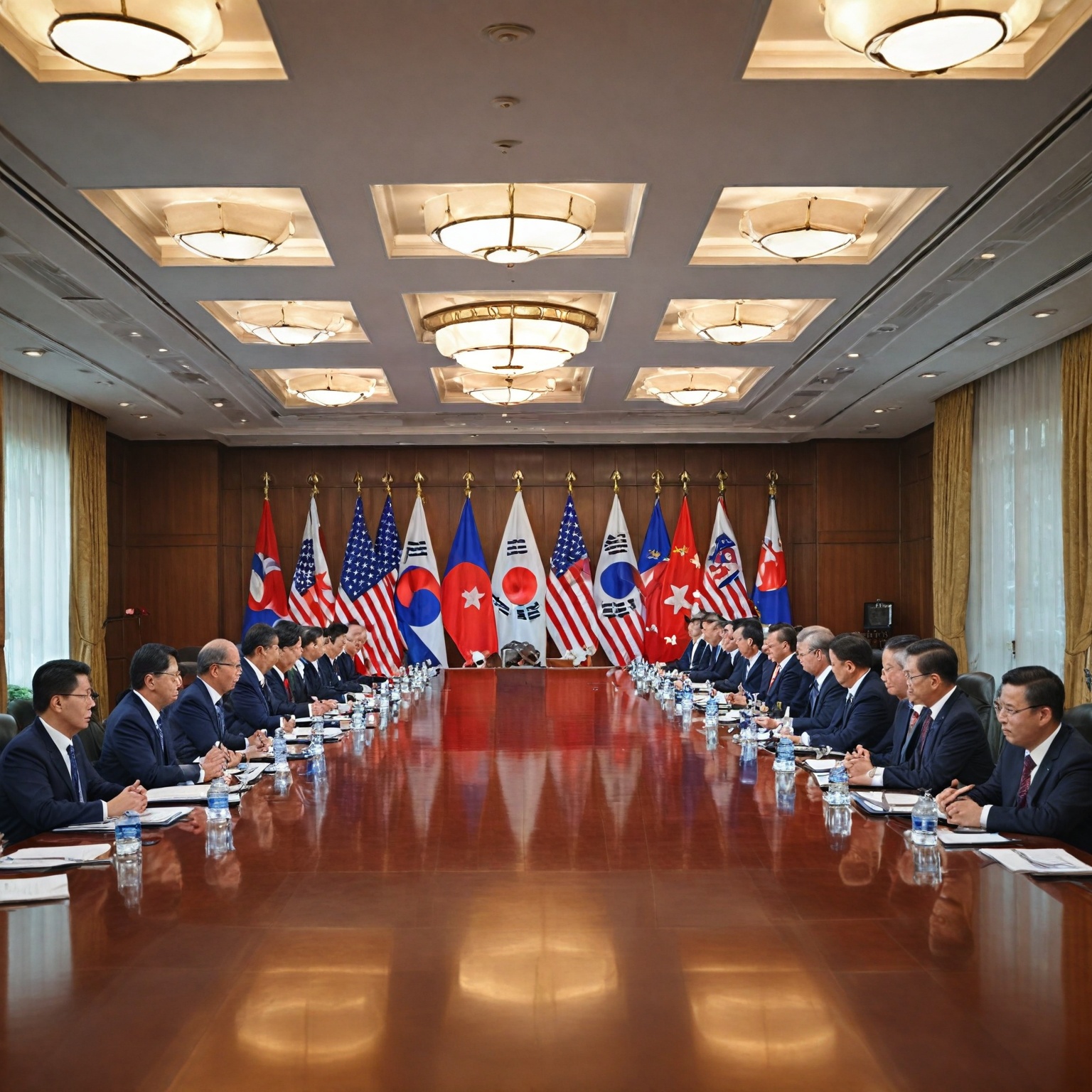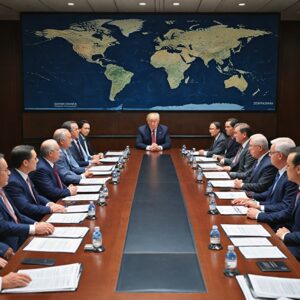Summary
Lee Jae-myung, a leading South Korean presidential candidate, has proposed extending and intensifying tariff discussions with the United States, seeking a more deliberate and mutually beneficial resolution to ongoing trade tensions between the two allies. His initiative comes amid heightened economic uncertainty caused by U.S. tariffs imposed on South Korean goods, which threaten key sectors such as automotive and semiconductors, and risk disrupting one of the United States’ most important trade relationships in Asia. Lee emphasizes pragmatic diplomacy that balances economic cooperation with the strengthening of South Korea’s defense capabilities and the U.S.-South Korea security alliance.
The backdrop to Lee’s proposal is a complex trade environment shaped by the Korea-U.S. Free Trade Agreement (KORUS FTA) and evolving geopolitical factors, including U.S.-China trade disputes and regional security concerns involving North Korea and Japan. South Korea has assumed a leading role in negotiations with the U.S., aiming to shape tariff policies in a way that protects its economic interests while supporting broader strategic alliances. The South Korean government has prepared extensive economic support packages to mitigate tariff impacts, underscoring the high stakes of these discussions for the nation’s export-driven economy.
From the U.S. perspective, the trade talks offer opportunities to improve market access and correct trade imbalances, potentially enhancing American exports and supporting jobs across multiple sectors. However, the negotiations are complicated by regional diplomatic tensions and criticism from China regarding U.S. trade tactics, as well as concerns about trilateral cooperation with Japan and South Korea. South Korea’s potential alignment with U.S. efforts to restrict trade with China has drawn particular scrutiny, highlighting the delicate geopolitical context influencing tariff discussions.
Lee’s proposal to extend tariff talks has elicited mixed reactions domestically and internationally. While some view South Korea’s leadership in the negotiations as vital to securing equitable trade terms and sustaining alliance stability, others caution that prolonged disputes could undermine regional unity and economic recovery. The outcome of these discussions will have significant implications for bilateral trade, regional security, and the future of economic cooperation between South Korea and the United States.
Background
The South Korea–United States trade relationship has been shaped significantly by the Korea-U.S. Free Trade Agreement (KORUS FTA), which was implemented on March 15, 2012, and later amended in September 2018. This agreement represents the largest free trade deal negotiated by the United States since NAFTA, aiming to enhance economic cooperation and market access between the two countries. Since its inception, the United States and South Korea have engaged in regular consultations to review the implementation of KORUS and to address outstanding trade issues, reflecting the dynamic nature of their economic partnership.
Trade negotiations between South Korea and the U.S. have often been influenced by broader geopolitical and economic factors. Recent discussions have been framed by tensions related to China’s criticism of U.S. trade tactics and the complex dynamics of defense cost-sharing, which have added layers of difficulty to achieving mutually beneficial agreements. The South Korean government has expressed anticipation for productive trade talks with U.S. officials, underscoring the importance of strengthening the bilateral alliance amid these challenges.
On the global stage, reciprocal tariffs have been a key issue influencing trade policies. For instance, the European Union experienced a reduction of a 20% “reciprocal” tariff to a baseline 10%, along with separate tariffs on cars and car parts, as part of ongoing efforts to negotiate tariff relief and foster international trade dialogue. The United States has also taken measures such as imposing and adjusting reciprocal tariffs to address trade imbalances with countries including China, highlighting a broader strategy to regulate imports and rectify trade practices contributing to persistent U.S. goods trade deficits.
These developments provide essential context for South Korea’s role in extending U.S. tariff discussions. With numerous countries seeking tariff alleviation and trade concessions, the potential exists for comprehensive economic reordering encompassing tariffs, foreign exchange valuation, and the international monetary system, possibly culminating in a significant multilateral accord. Within this complex environment, South Korea’s proactive engagement and leadership in trade negotiations signify its strategic importance in shaping future U.S. tariff policies.
Proposal Details
South Korean presidential frontrunner Lee Jae-myung has called for reconsidering the deadline to reach a deal with the United States on President Donald Trump’s trade tariffs, emphasizing the need to find a mutually beneficial agreement between the two allies. Lee advocates for maintaining and strengthening South Korea’s defense capabilities and the South Korea-U.S. security alliance while promoting a diplomatic approach based on dialogue, cooperation, communication, and coexistence. He sees pragmatism as a key to diplomacy in navigating the complex trade and security issues with the U.S..
The South Korean government, responding to economic risks heightened by the global trade war and domestic political uncertainty, proposed a supplementary budget of 12.2 trillion won ($8.60 billion) to support economic growth and counteract the potential negative impact of the tariffs. Authorities have also prepared extensive measures, including 28.6 trillion won ($20.6 billion) in aid packages aimed at preventing liquidity problems, expanding export markets, and supporting reshoring efforts for companies operating overseas. Additional support for biopharmaceutical companies was also promised once further details of U.S. tariffs on the sector become available.
South Korea’s Finance Minister Choi Sang-mok highlighted the priority of delaying the tariffs “as much as possible” to reduce uncertainty faced by South Korean businesses in the global market. He expressed a desire to negotiate thoroughly and complete agreements under the incoming government, reflecting a strategic approach to managing the trade dispute. Meanwhile, the agenda for the ongoing trade talks with the U.S. remains under coordination, with details yet to be confirmed.
South Korea’s Leadership Role in Trade Negotiations
South Korea has taken a proactive leadership role in the ongoing trade negotiations with the United States, positioning itself as a key player in shaping the bilateral economic agenda. Acting President and Prime Minister Han Duck-soo has expressed a willingness to reach a deal with Washington, emphasizing South Korea’s debt of gratitude to the U.S. for its assistance during the Korean War and signaling a cooperative stance toward the talks. Despite internal political opposition from the main liberal Democratic Party, which accuses the current conservative administration of rushing negotiations for political advantage, Han has maintained that the country will not resist U.S. demands.
High-level officials from both countries have convened in Washington with the intention of crafting a comprehensive package on tariffs and economic cooperation by early July. However, South Korean trade officials have noted the tight timeline and potential for delays, especially given the upcoming elections, cautioning that negotiations should yield mutual benefits rather than one-sided concessions. The agenda for the talks remains fluid and is still being coordinated between the two governments, though reports indicate that discussions may include South Korea joining broader U.S. efforts to curb trade with China—a move that has already drawn criticism from Beijing.
South Korea’s leadership is further underscored by its position as a member of the World Trade Organization and its commitments under subsidiary agreements such as TRIPs and the Government Procurement Agreement, which provide a framework for its trade policy and international obligations. The complexity of these negotiations also reflects a broader strategic calculus, as both Seoul and Washington seek to reinforce their alliance amid regional security concerns involving North Korea and China.
The South Korean government advocates for balanced diplomacy that benefits both parties, with Trade Minister Lee recently emphasizing that diplomacy must not become a unilateral advantage or “plunder”. This stance highlights South Korea’s attempt to lead negotiations toward equitable outcomes, even as the U.S. pursues a broader international accord potentially encompassing tariffs, foreign exchange valuation, and the dollar’s role in global reserves.
Economic Implications for South Korea
The imposition and potential extension of U.S. tariffs on South Korean goods have significant economic implications for South Korea, impacting key industries and the broader trade relationship between the two countries. The tariffs, reportedly around 25% on all products manufactured in Korea and imported into the U.S., are expected to reshape the competitive environment for South Korean exports and create headwinds, particularly for flagship sectors such as the automotive and semiconductor industries.
South Korea’s automotive sector faces immediate challenges as higher U.S. tariffs increase costs and threaten export volumes and profit margins. The tariffs affect not only finished vehicles but also raw materials and components, causing a ripple effect that raises production costs and could reduce demand in the U.S. market, one of South Korea’s largest trading partners. In response, the South Korean government has prepared extensive support measures, including a 28.6 trillion won ($20.6 billion) package aimed at mitigating liquidity issues, expanding export markets, and subsidizing reshoring efforts by companies operating overseas. These measures are intended to cushion the impact ahead of the July 8 deadline when most U.S. tariffs are scheduled to take effect after a 90-day pause.
The semiconductor industry, vital to both South Korea’s economy and global technology supply chains, is also at risk. South Korea is a major supplier of memory chips essential for U.S. electronics companies, which rely on these components for mobile phones, electronic devices, and data processing hardware. Disruptions caused by tariffs or trade disputes could lead to supply shortages, affecting U.S. firms with production hubs in both the U.S. and China. The sensitivity of this sector has led business leaders from Korea and Japan to urge diplomatic solutions to avoid prolonged conflicts.
Beyond immediate sectoral impacts, the broader trade tensions threaten to slow economic growth amid global uncertainty. South Korea’s government has proposed a supplementary budget of 12.2 trillion won ($8.6 billion) to address these risks, underscoring concerns over the escalation of the trade war and domestic political challenges. The U.S.-South Korea trade dynamics remain complex, especially given past agreements that sought to enhance market access and reduce barriers for U.S. automakers and other industries, which now contrast with the recent tariff impositions.
The ongoing negotiations and South Korea’s leading role in extending discussions with the U.S. reflect attempts to mitigate these economic challenges. Maintaining strong trade ties and avoiding further tariff escalations are critical to preserving South Korea’s export competitiveness and stabilizing its economic outlook in the face of global trade disruptions.
Implications for the United States
The ongoing tariff discussions between the United States and South Korea hold significant implications for U.S. economic and strategic interests. Economically, the agreement is expected to enhance American exports by reducing or adjusting tariffs imposed by South Korea on U.S. goods, thereby improving the U.S. trade balance. The U.S. International Trade Commission (ITC) estimates that the U.S. goods trade balance with South Korea could improve by $3.3 billion to $4 billion as a result of the agreement. Beyond goods, the deal opens access to South Korea’s $580 billion services market, creating new opportunities for American companies in sectors such as express delivery, engineering, legal and accounting services, education, and health care. This expanded access is projected to support additional jobs for American workers and contribute positively to U.S. economic growth and recovery.
Moreover, the ITC highlights that, based on tariff cuts and adjustments alone, the economic output increase from the U.S.-South Korea agreement is expected to surpass that of the previous nine U.S. trade agreements combined. This underscores the strategic importance of a successful negotiation for America’s farmers, manufacturers, and service providers, who stand to gain a more level playing field and improved competitiveness.
Strategically, the tariff discussions intersect with broader geopolitical concerns in the Asia-Pacific region. U.S. officials have expressed worry that unresolved disputes between South Korea and Japan, along with tensions related to China and North Korea, could weaken trilateral cooperation essential to the United States’ regional strategy. The U.S. relies on strong partnerships with South Korea and Japan to maintain a united front against North Korean provocations and the rising influence of China. Furthermore, South Korea’s role as a crucial supplier of advanced memory chips places U.S. electronics companies at risk of supply shortages, highlighting the importance of stable trade relations with Seoul. This is especially pertinent as many U.S. electronics firms depend on South Korean components for their hardware and data processing needs.
Diplomatic efforts surrounding the trade talks are also influenced by geopolitical tensions, including China’s criticism of U.S. trade tactics and concerns about defense cost-sharing arrangements. The complexity of these issues suggests that negotiations may face challenges beyond pure economic considerations, with the potential to affect the broader alliance between the two countries. Notably, discussions may include South Korea’s participation in U.S. efforts to curb trade with China, a move that has elicited warnings from Beijing and could complicate diplomatic relations.
International and Regional Impact
Lee’s proposal to extend U.S. tariff discussions positions South Korea as a pivotal player in shaping broader international trade dynamics, particularly in the context of U.S. economic and strategic interests in Asia. The ongoing negotiation efforts are seen as part of a larger potential economic realignment involving tariffs, foreign exchange valuations, and the role of the U.S. dollar in international reserves, which could culminate in a significant accord under the Trump administration’s leadership.
From a regional security perspective, the U.S. remains cautious about becoming entangled in historically rooted disputes between its allies, Japan and South Korea. However, Washington recognizes that unresolved tensions could undermine the trilateral cooperation crucial to countering threats from North Korea and China. The effective resolution of these disputes is also essential for maintaining the strength of the global technology sector and safeguarding U.S. interests in Asia.
On the economic front, South Korea anticipates productive trade discussions with the U.S. aimed at achieving mutually beneficial outcomes. Strengthening the alliance through high-level meetings in Washington underscores the strategic importance of these negotiations, even as external pressures, such as criticism from China and complications related to defense cost-sharing, continue to influence the talks. The U.S. seeks to enhance market access to South Korea, a high-growth economy, which is expected to contribute positively to the U.S. economy by improving trade balances.
Furthermore, regulatory measures such as amendments to reciprocal tariffs and updated duties on low-value imports from China illustrate ongoing efforts to rectify trade practices contributing to persistent U.S. trade deficits. These adjustments reflect a broader strategy to address trade imbalances through reciprocal tariffs and trade policy reforms.
Timeline of Events
Following the impeachment and removal of President Yoon Suk Yeol, who had briefly declared martial law in December, a snap presidential election was scheduled for June 3. Lee, the candidate from the main opposition Democratic Party of Korea, quickly emerged as the frontrunner in opinion polls, surpassing conservative contenders. Amid this political backdrop, Seoul and Washington announced their intent to finalize a package on tariffs and economic cooperation by July 8.
However, the South Korean minister for trade and industry expressed concerns that the election timeline might hinder the timely conclusion of these negotiations, suggesting that delays were possible due to the ongoing political uncertainty. Lee himself acknowledged the tight schedule, stating, “There is not much time,” underscoring the urgency of the talks.
Throughout this period, the agenda for the upcoming trade discussions remained unconfirmed, with the South Korean industry ministry emphasizing that coordination with the U.S. was still underway. High-level officials from both countries were expected to meet in Washington to strengthen bilateral ties, although issues such as U.S. defense cost-sharing and criticism from China regarding U.S. trade tactics added complexity to the negotiations.
In the lead-up to the election, Lee highlighted that tariff negotiations with the United States would be one of the most significant challenges for the incoming administration. This underscored the critical nature of the trade talks amid shifting political dynamics and international pressures.
Criticism and Support
The proposal by Lee to extend U.S. tariff discussions in a leading role for South Korea has drawn mixed reactions from various stakeholders. On one hand, some U.S. officials express concern that prolonged disputes between allies such as South Korea and Japan could undermine the united front necessary to address challenges posed by North Korea and China. The success of the United States’ strategy in Asia is seen as dependent on trilateral cooperation among these countries, leading to cautious support for efforts aimed at resolving trade tensions[15
The content is provided by Harper Eastwood, Fact-Nest













